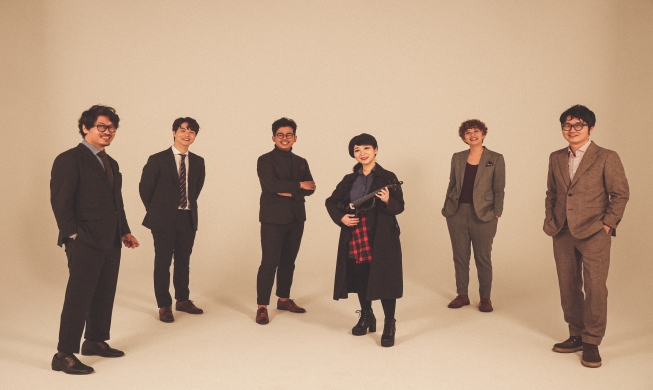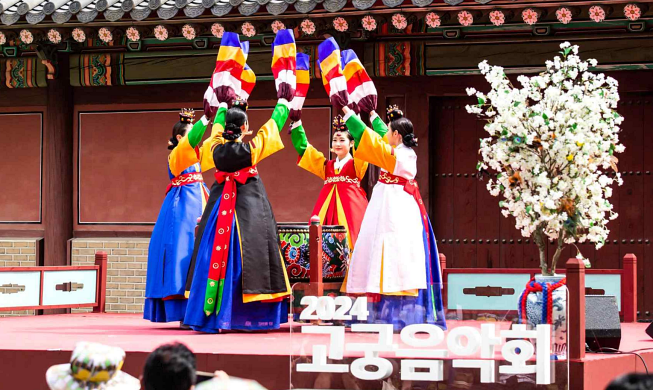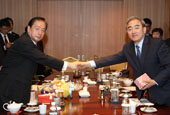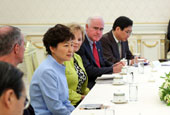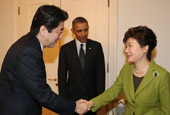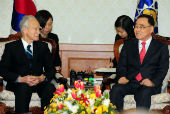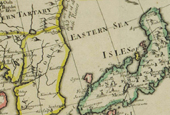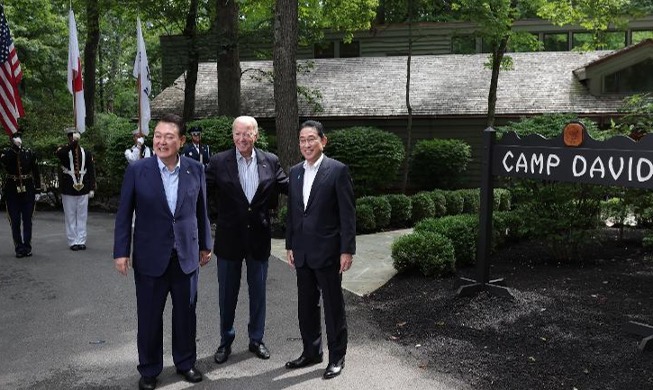-
 Korea.net's 24-hour YouTube channel
Korea.net's 24-hour YouTube channel- NEWS FOCUS
- ABOUT KOREA
- EVENTS
- RESOURCES
- GOVERNMENT
- ABOUT US

President Park Geun-hye met with Yoichi Masuzoe, governor of Tokyo, on July 25 to discuss pending issues between Korea and Japan, including ongoing historical debates between the two countries.
President Park said that the peoples of the two nations have amiable relations and a true friendship, but that she is sorry that with recent difficulties in their bilateral relationship, the public of the two nations are becoming more distant from each other.
The president said that some Japanese politicians' inappropriate remarks and behavior have made the international relationship more difficult, but that she hoped Governor Masuzoe would try to help the relationship develop in a stable manner, with a proper recognition of history. She also said that the debate concerning comfort women during World War II is a universal human rights issue and that she hoped the Japanese government would make a sincere effort toward solving the problem.
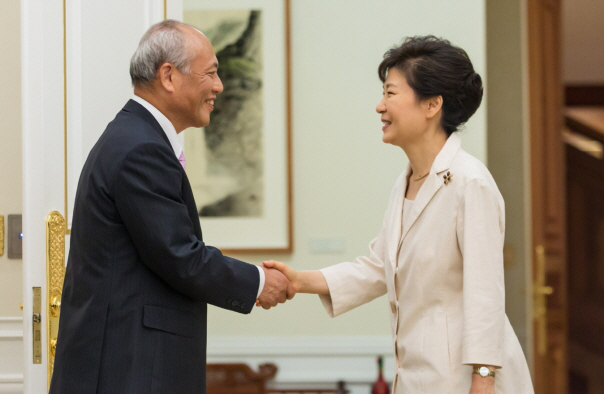
Governor Masuzoe visited memorials in Seoul, Suwon and Ansan to pay tribute to the victims of the recent Sewol ferry sinking and expressed his utmost condolences on behalf of all Tokyo residents. In regard to the establishment of what would be a second South Korean school in Tokyo, the governor said that he would do his best to help found the new Korean school in his jurisdiction.
Speaking of Korea's concern over hate speech targeted at ethnic Korean Japanese people, Masuzoe said that it is a very shameful act and that Tokyo is going to hold a human rights week in the coming autumn and will educate the public concerning human rights. With his personal resolution that Tokyo cannot host the 2020 Olympic Games if hate speech continues, he said he would work hard to protect all residents of Tokyo, including the ethnic Korean Japanese, throughout his term in office.
President Park expressed concern that anti-Korean demonstrations by some Japanese groups not only offend the South Korean public, but could also harm Japan's international reputation. The president said she hopes that the Tokyo prefecture would come up with definite policies to prevent the safety and livelihood of ethnic Korean Japanese from being harmed. This would deliver a strong message to the South Korean public that the Japanese government is against such hateful acts toward ethnic Koreans. The Tokyo governor said he would closely monitor businesses owned and operated by ethnic Korean Japanese in the Tokyo prefecture to see whether they have any problems connected with the demonstrations and to see how to improve their situation.
Regarding the 2018 Olympic Winter Games in Pyeongchang and the 2020 Olympic Summer Games in Tokyo, Masuzoe said the two countries should cooperate to successfully host the two Olympics, and should share their experiences and use of advanced information technology. Park responded that it is unprecedented that Winter and Summer Olympic Games are hosted one after another in Asia, and that the two Olympic Games could create synergies and contribute to the development of sports and business across Asia.
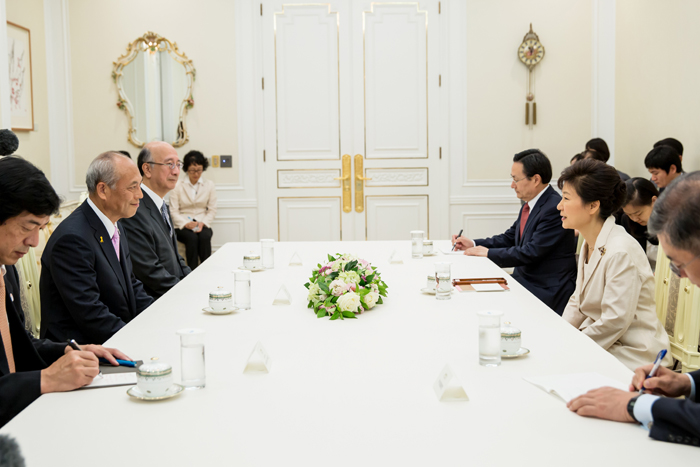
Masuzoe said that in a meeting with Japanese Prime Minister Shinzo Abe right before his departure for Korea, he said to the prime minister that Korea-Japan relations are very important and that the two nations should have a future-oriented relationship. According to the governor, the prime minister agreed with him and asked him to deliver a message to President Park that he "would make an effort to improve Korea-Japan relations."
President Park said that both Korea and Japan are allies that should cooperate for the peace and prosperity of Northeast Asia and that since her inauguration, she has emphasized Korea-Japan relations. The president continued to say, though, that unless their bilateral relations can be built upon a proper understanding of history, their relationship will not be able to develop into one based on sincerity and trust. She hoped that their bilateral relationship would become one based on a fair recognition of history and develop on a solid foundation, built with sincerity and trust.
The president also said that every country has its own territory and history and that geographic territory is equivalent to a person's body and that a nation's history is equivalent to a person's soul. If the soul is hurt, the fundamentals could become unstable, she emphasized. She concluded by saying that the two neighboring nations historically have had a broad range of interchanges, and that politics should not get in between the peoples of the two nations.
By Wi Tack-whan, Limb Jae-un
Korea.net Staff Writers
whan23@korea.kr

President Park said that the peoples of the two nations have amiable relations and a true friendship, but that she is sorry that with recent difficulties in their bilateral relationship, the public of the two nations are becoming more distant from each other.
The president said that some Japanese politicians' inappropriate remarks and behavior have made the international relationship more difficult, but that she hoped Governor Masuzoe would try to help the relationship develop in a stable manner, with a proper recognition of history. She also said that the debate concerning comfort women during World War II is a universal human rights issue and that she hoped the Japanese government would make a sincere effort toward solving the problem.

President Park Geun-hye (right) meets with Yoichi Masuzoe, governor of Tokyo, on July 25. (photo: Cheong Wa Dae) President Park Geun-hye (right) meets with Yoichi Masuzoe, governor of Tokyo, and discusses pending issues including historical debates between Korea and Japan. (photo: Cheong Wa Dae)
Governor Masuzoe visited memorials in Seoul, Suwon and Ansan to pay tribute to the victims of the recent Sewol ferry sinking and expressed his utmost condolences on behalf of all Tokyo residents. In regard to the establishment of what would be a second South Korean school in Tokyo, the governor said that he would do his best to help found the new Korean school in his jurisdiction.
Speaking of Korea's concern over hate speech targeted at ethnic Korean Japanese people, Masuzoe said that it is a very shameful act and that Tokyo is going to hold a human rights week in the coming autumn and will educate the public concerning human rights. With his personal resolution that Tokyo cannot host the 2020 Olympic Games if hate speech continues, he said he would work hard to protect all residents of Tokyo, including the ethnic Korean Japanese, throughout his term in office.
President Park expressed concern that anti-Korean demonstrations by some Japanese groups not only offend the South Korean public, but could also harm Japan's international reputation. The president said she hopes that the Tokyo prefecture would come up with definite policies to prevent the safety and livelihood of ethnic Korean Japanese from being harmed. This would deliver a strong message to the South Korean public that the Japanese government is against such hateful acts toward ethnic Koreans. The Tokyo governor said he would closely monitor businesses owned and operated by ethnic Korean Japanese in the Tokyo prefecture to see whether they have any problems connected with the demonstrations and to see how to improve their situation.
Regarding the 2018 Olympic Winter Games in Pyeongchang and the 2020 Olympic Summer Games in Tokyo, Masuzoe said the two countries should cooperate to successfully host the two Olympics, and should share their experiences and use of advanced information technology. Park responded that it is unprecedented that Winter and Summer Olympic Games are hosted one after another in Asia, and that the two Olympic Games could create synergies and contribute to the development of sports and business across Asia.

President Park Geun-hye (right) meets with Yoichi Masuzoe, governor of Tokyo, and discusses pending issues including historical debates between Korea and Japan. (photo: Cheong Wa Dae)
Masuzoe said that in a meeting with Japanese Prime Minister Shinzo Abe right before his departure for Korea, he said to the prime minister that Korea-Japan relations are very important and that the two nations should have a future-oriented relationship. According to the governor, the prime minister agreed with him and asked him to deliver a message to President Park that he "would make an effort to improve Korea-Japan relations."
President Park said that both Korea and Japan are allies that should cooperate for the peace and prosperity of Northeast Asia and that since her inauguration, she has emphasized Korea-Japan relations. The president continued to say, though, that unless their bilateral relations can be built upon a proper understanding of history, their relationship will not be able to develop into one based on sincerity and trust. She hoped that their bilateral relationship would become one based on a fair recognition of history and develop on a solid foundation, built with sincerity and trust.
The president also said that every country has its own territory and history and that geographic territory is equivalent to a person's body and that a nation's history is equivalent to a person's soul. If the soul is hurt, the fundamentals could become unstable, she emphasized. She concluded by saying that the two neighboring nations historically have had a broad range of interchanges, and that politics should not get in between the peoples of the two nations.
By Wi Tack-whan, Limb Jae-un
Korea.net Staff Writers
whan23@korea.kr
Related Contents
Most popular
- Band Second Moon spreads fusion sound on California tour
- 76 national heritage sites to allow free admission from May 15
- First Korean-style 'taxi driver' diner opened in New York
- Africa's appeal on full display at downtown festival in Seoul
- UK univ., KCC in London host Korea Day event in Sheffield



